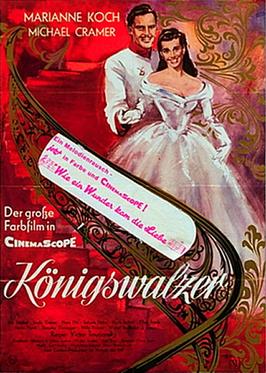
The Royal Waltz is a 1955 West German musical film romance film directed by Victor Tourjansky starring Marianne Koch, Michael Cramer and Linda Geiser. It is a remake of the 1935 film of the same name, part of the tradition of operetta films. It was shot at the Bavaria Studios in Munich and the Carlton Studios in the same city. Location shooting took place in Munich's Englischer Garten and Nymphenburg Palace. The film's sets were designed by the art director Hermann Warm.
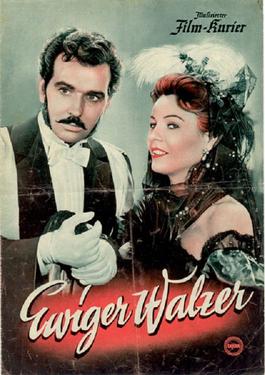
The Eternal Waltz is a 1954 West German drama film dramatizing the life of Johann Strauss II. The initial story was written by Hanns Marschall and Ruth Charlotte Silbermann, and the film itself was written by Alexander Lix; the adaptation was by Paul Verhoeven who also directed the film.
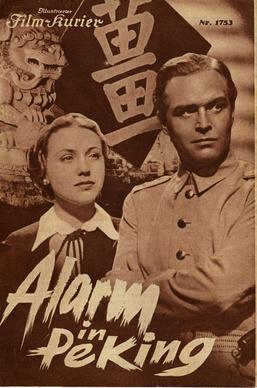
Alarm in Peking is a 1937 German adventure film directed by Herbert Selpin and starring Gustav Fröhlich, Leny Marenbach, and Peter Voß. It is set against the backdrop of the 1900 Boxer Rebellion in China. German filmmakers had frequently used China as a setting since the 1910s, but from 1931 onwards they made a series of films with political overtones. It was shot at the Johannisthal Studios in Berlin. The film's sets were designed by the art director Alfred Bütow and Willi Herrmann.

Music by Night is a 1953 German comedy film directed by Kurt Hoffmann and starring Paul Hubschmid, Gertrud Kückelmann and Curd Jürgens. It was shot at the Bavaria Studios in Munich. The film's sets were designed by the art director Robert Herlth.
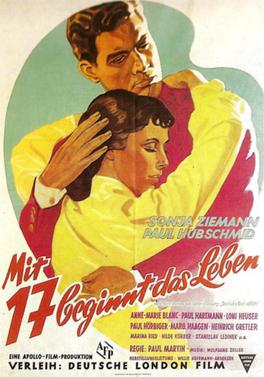
Life Begins at Seventeen is a 1953 West German romance film directed by Paul Martin and starring Sonja Ziemann, Paul Hubschmid and Paul Hörbiger. It was shot at the Tempelhof Studios in West Berlin. The film's sets were designed by the art director Wilhelm Vorwerg.
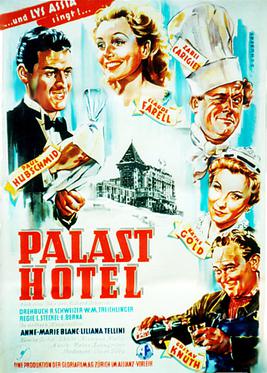
Palace Hotel is a 1952 Swiss-West German drama film directed by Emil Berna and Leonard Steckel and starring Paul Hubschmid, Käthe Gold and Anne-Marie Blanc. It was made at the Bellerive Studios in Zürich. The film's sets were designed by the art director Jean d'Eaubonne.

My Niece Susanne is a 1950 West German musical comedy film directed by Wolfgang Liebeneiner and starring Hilde Krahl, Inge Meysel and Harald Paulsen. It is set in Paris at the beginning of the twentieth century.

The Sergeant's Daughter is a 1952 West German war romance film directed by George Hurdalek and starring Johanna Matz, Jan Hendriks and Friedrich Domin. It was based on a 1903 novel by Franz Adam Beyerlein which portrayed life in the army of William II.

The Golden Bridge is a 1956 West German drama film directed by Paul Verhoeven and starring Ruth Leuwerik, Curd Jürgens and Paul Hubschmid. It was shot at the Bavaria Studios in Munich. The film's sets were designed by the art director Max Mellin.

White Shadows is a 1951 West German drama film directed by Helmut Käutner and starring Hilde Krahl, Hans Söhnker and Claude Farell.

Night of Decision is a 1956 West German drama film directed by Falk Harnack and starring Carl Raddatz, Hilde Krahl and Albert Lieven. It was shot at Göttingen Studios and on location in Belgium. The film's sets were designed by the art directors Walter Haag.

Dreaming is a 1944 German historical musical drama film directed by Harald Braun and starring Hilde Krahl, Mathias Wieman and Friedrich Kayssler. It portrays the lives of the pianist Clara Schumann and her composer husband Robert Schumann.

What Does Brigitte Want? is a 1941 German comedy film directed by Paul Martin and starring Leny Marenbach, Albert Matterstock and Fita Benkhoff.

Serenade is a 1937 German drama film directed by Willi Forst and starring Hilde Krahl, Albert Matterstock and Igo Sym. The film was based on a novel by Theodor Storm, which was adapted again in 1958 as I'll Carry You in My Arms by Veit Harlan.
Love Letters is a 1944 German comedy film directed by Hans H. Zerlett and starring Käthe Haack, Hermann Thimig, and Paul Hubschmid.
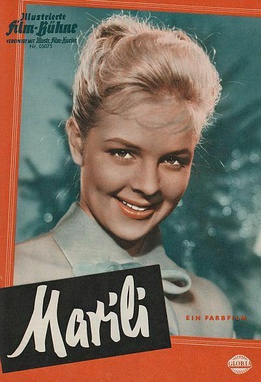
Marili is a 1959 West German romantic comedy film directed by Josef von Báky and starring Sabine Sinjen, Paul Hubschmid and Helmuth Lohner.
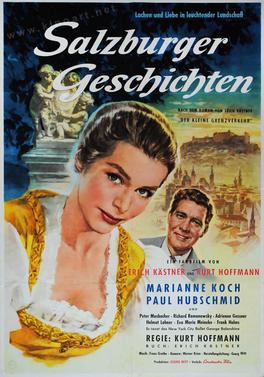
Salzburg Stories is a 1957 West German romantic comedy film directed by Kurt Hoffmann and starring Marianne Koch, Paul Hubschmid and Peter Mosbacher. It was shot at the Bavaria Studios in Munich. The film's sets were designed by the art director Ludwig Reiber.

The Schimeck Family is a 1935 German comedy film directed by E.W. Emo and starring Hans Moser, Käthe Haack and Hilde Schneider. It was shot at Johannisthal Studios in Berlin. The film's sets were designed by the art directors Karl Böhm and Heinrich Richter. It is based on the play The Schimek Family by Gustaf Kadelburg, previously adapted into a 1926 silent film and later into a 1957 Austrian film.

Her Highness the Saleswoman is a 1933 German comedy film directed by Karl Hartl and starring Liane Haid, Willi Forst and Paul Kemp. The film is based on the play My Sister and I by Georges Berr and Louis Verneuil. It was shot at the Babelsberg Studios in Potsdam. Location shooting took place around Lake Constance and Lindau in Bavaria. The film's sets were designed by the art director Werner Schlichting. It premiered in Hamburg and first appeared in Berlin at the city's Gloria-Palast. A separate French-language version The Princess's Whim was also produced.

Girls' Dormitory is a 1936 Austrian drama film directed by Géza von Bolváry and starring Raoul Aslan, Angela Salloker and Erika von Thellmann. The film's sets were designed by the art director Márton Vincze.



















